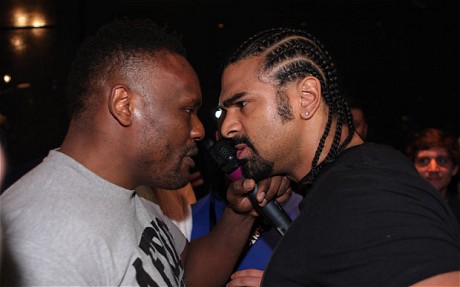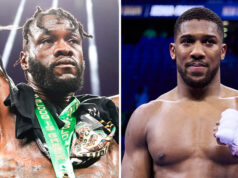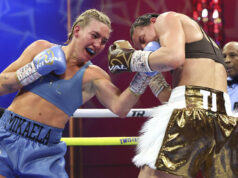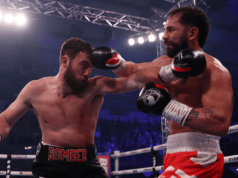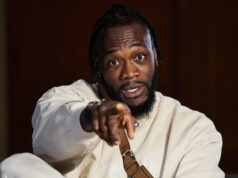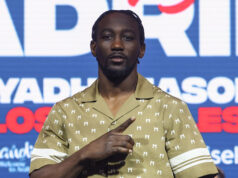Heavyweight boxing is no stranger to controversy. As contenders jockey and tussle for what is arguably the most famed prize in sports – the heavyweight championship of the world – they can often struggle under the strain of public responsibility that is associated with being so close to such a monumental status. David Haye and Dereck Chisora are two such contenders. Or offenders.
Dereck Chisora put up a valiant challenge back in February as he tried to wrest away part of the Klitschko brothers’ grip on the heavyweight world titles by facing off against the older of the two, Vitali. His brave effort was forgotten in the aftermath of the event, however. David Haye tried to scupper the post-fight press conference and divert attention on to a potential clash between himself and the elder brother, and then Chisora and Haye came skull to skull. The events that followed are now infamous and led to the revoking of Chisora’s boxing license for an undetermined period of time.
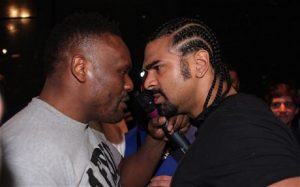
Chisora had done himself no favors. He had a history of offenses within the boxing community. In 2009, he bit Paul Butlin’s ear while they fought. He was suspended for four months and fined. In the lead up to his world title challenge, he slapped the champion; Vitali Klitschko. Once in the ring, he spat water at Vitali’s brother and fellow champion; Wladimir. He was fined £32,000 ($50,000) for his misdemeanors and sent on his way.
Chisora had misrepresented himself and paid the price. His involvement in the post-fight brawl with Haye, however, led the British Boxing Board of Control (BBBofC) to withdraw his license and left him without a future. Thus when Haye, who had retired from boxing last October, was paired with Chisora; a pariah widely scorned and without a license, the general media went to town. A field day was had with promoter Frank Warren taking most of the flack.
Boxing’s lack of a universal code of regulations came to the fighters’ rescue and to the BBBoC’s demise, however, as the fight was announced under the Luxembourg Boxing Federation. Some initially claimed the fight was unlicensed, the opposite is in fact true. Laugh if you want — but rightly or wrongly, this is a genuine boxing commission, happy to stage the fight under its own name. It’s legal, similar things happen in other countries, and it has made possible one of the most intriguing heavyweight match-ups in recent memory.
Many believe this fight should not happen and on the face of it they have sound reasoning. They feel this fight is a finger in the face of the BBBofC. They feel it may open up dangerous avenues in the future. They feel two fighters will benefit financially from the shaming of the very sport that defines them. They say that although the fight itself gears up to be entertaining, what’s to stop other fighters from following a similar path down the line.
I see and understand what they are saying, but I just can’t quite get on board with it all. Maybe I’m not tall enough to climb on the high horse, perhaps my moral code is more fractured than boxing’s regulatory system. Maybe, just maybe, I’m just a little over-excited by the possibility of a competitive heavyweight fight that will not bore me to the point of distraction.
I agree that this fight is a thumb’s down to the BBBofC, but what’s the major issue there? David Haye, a boxer may I remind you, threw two punches at Dereck Chisora as Chisora approached him mic in hand. Haye, who was unlicensed anyway due to his retirement from the sport [Editor’s note: Since Haye was “retired” at the time of the transgressions, he could not be punished as such], then wailed a camera stand around. Chisora may have a past history, but he has paid for those sins and he did nothing in this instance to warrant having his right to box taken away from him. Instead, I feel the fierce media backlash led to a hasty decision from the BBBofC.
Let us also remind ourselves that this is a unique situation. The only reason the fight is taking place under such circumstances is because the BBBofC are unwilling to sanction it for the various aforementioned reasons. This is not a regular circumstance; the chances of such an event taking place in the future are extremely unlikely. These are two fighters who have been penalized, in my opinion, largely as a result of media reaction. Had this fight taken place without the hubris of the Munich brawl, nobody would be complaining.
As for the two men benefiting financially, well, this is what happens in sports entertainment. Those who follow boxing closely would have watched this fight anyway. At it’s core, it’s a fight built upon two top quality heavyweight fighters from London battling for local pride and a second chance at the big time. Simply put, it makes sense.
It is only the casual fan, he who tunes in when the stakes are high, who will pay specific attention to this bout having viewed the mayhem in Munich on the internet. The old saying goes “there is no such thing as bad publicity” and although some may complain, the majority will be watching with enthusiasm come fight night regardless of their reason for doing so.
Boxing is a niche sport nowadays and it is thus far easier for the general public to attack. Some of the responses to this fight being made were shameful. Frank Warren was made to look a fool as fellow British boxing promoters jumped aboard the strident media ship to proclaim this fight as the death of boxing. They took satisfaction in watching Warren’s reputation crumble from the outside. They happily took the other side at a time when boxing came under a beating.
To those who are not sure as to whether they will watch on this Saturday night, I say remove yourself of any guilt and enjoy the fight.
It may be strange. It is definitely unique. But this is a genuine heavyweight clash, and peoples’ eyes, willingly or not, will be fixated on the action between the ropes this Saturday night.


